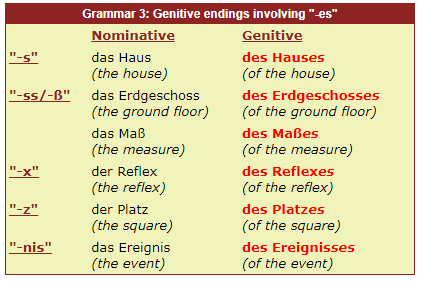Formation of the genitive case
The genitive is the fourth and final German case that we shall encounter. It is used primarily to denote possession and also after certain prepositions. The genitive endings of nouns in the singular and plural are listed below along with the genitive endings of the definite article:
The basic rules for genitive endings
1. No endings are added to feminine singular nouns or to any plural nouns in the genitive case. The definite article in both of these cases is "der".
2. Masculine and neuter nouns in the singular add either "-s" or "-es". The definite article in both of these cases is "des".
Genitive singular endings: "-s" or "-es"?
How do you decide whether you should add "-s" or "-es" to the genitive singular of masculine and neuter singular nouns?
"-es" should be added:
with nouns ending in "-s", "-ss/-ß", "-x" or "-z"
(usually) with nouns ending in "-sch", "-st" or "-zt"
with neuter nouns ending in "-nis": the ending then becomes "-nisses"


N.B. Foreign nouns ending in "-s" or "-x" usually have no ending in the genitive - e.g. "des Organismus" (= of the organism), "des Rhythmus" (= of the rhythm), "des Index" (= of the index).
However some key foreign words such as "der Bus" and "der Kongress" are now deemed to have been assimilated into the German language and thus add "-es" in the genitive - "des Busses" (= of the bus), "des Kongresses" (= of the congress).
 英语
英语 日语
日语 韩语
韩语 法语
法语 西班牙语
西班牙语 意大利语
意大利语 阿拉伯语
阿拉伯语 葡萄牙语
葡萄牙语 越南语
越南语 俄语
俄语 芬兰语
芬兰语 泰语
泰语 丹麦语
丹麦语 对外汉语
对外汉语

